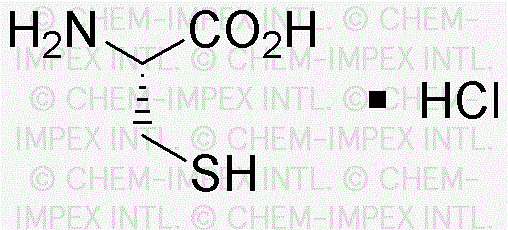L-Cysteine hydrochloride anhydrous is widely utilized in research focused on:
- Pharmaceutical Development: It serves as a key ingredient in formulations for medications aimed at treating respiratory conditions, as it helps to break down mucus and improve lung function.
- Food Industry: This compound acts as a flavor enhancer and antioxidant in food products, improving shelf life and taste, particularly in processed meats and baked goods.
- Cosmetic Applications: It is incorporated into skincare products for its antioxidant properties, helping to protect skin from damage and promoting a youthful appearance.
- Biotechnology: L-Cysteine hydrochloride is essential in cell culture media, supporting the growth and maintenance of various cell lines used in research and production.
- Amino Acid Supplements: It is commonly found in dietary supplements aimed at enhancing athletic performance and recovery, as it plays a crucial role in protein synthesis and detoxification.
General Information
Properties
Safety and Regulations
Applications
L-Cysteine hydrochloride anhydrous is widely utilized in research focused on:
- Pharmaceutical Development: It serves as a key ingredient in formulations for medications aimed at treating respiratory conditions, as it helps to break down mucus and improve lung function.
- Food Industry: This compound acts as a flavor enhancer and antioxidant in food products, improving shelf life and taste, particularly in processed meats and baked goods.
- Cosmetic Applications: It is incorporated into skincare products for its antioxidant properties, helping to protect skin from damage and promoting a youthful appearance.
- Biotechnology: L-Cysteine hydrochloride is essential in cell culture media, supporting the growth and maintenance of various cell lines used in research and production.
- Amino Acid Supplements: It is commonly found in dietary supplements aimed at enhancing athletic performance and recovery, as it plays a crucial role in protein synthesis and detoxification.
Documents
Safety Data Sheets (SDS)
The SDS provides comprehensive safety information on handling, storage, and disposal of the product.
Product Specification (PS)
The PS provides a comprehensive breakdown of the product’s properties, including chemical composition, physical state, purity, and storage requirements. It also details acceptable quality ranges and the product's intended applications.
Certificates of Analysis (COA)
Search for Certificates of Analysis (COA) by entering the products Lot Number. Lot and Batch Numbers can be found on a product’s label following the words ‘Lot’ or ‘Batch’.
*Catalog Number
*Lot Number
Certificates Of Origin (COO)
This COO confirms the country where the product was manufactured, and also details the materials and components used in it and whether it is derived from natural, synthetic, or other specific sources. This certificate may be required for customs, trade, and regulatory compliance.
*Catalog Number
*Lot Number
Safety Data Sheets (SDS)
The SDS provides comprehensive safety information on handling, storage, and disposal of the product.
DownloadProduct Specification (PS)
The PS provides a comprehensive breakdown of the product’s properties, including chemical composition, physical state, purity, and storage requirements. It also details acceptable quality ranges and the product's intended applications.
DownloadCertificates of Analysis (COA)
Search for Certificates of Analysis (COA) by entering the products Lot Number. Lot and Batch Numbers can be found on a product’s label following the words ‘Lot’ or ‘Batch’.
*Catalog Number
*Lot Number
Certificates Of Origin (COO)
This COO confirms the country where the product was manufactured, and also details the materials and components used in it and whether it is derived from natural, synthetic, or other specific sources. This certificate may be required for customs, trade, and regulatory compliance.


